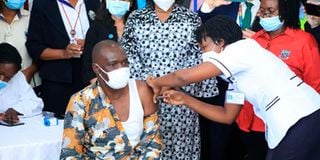Health workers in Kenya hesitant about taking Covid-19 vaccine

KMPDU acting Secretary-General, Dr Chibanzi Mwachonda, addresses the media in Nairobi on September 7, 2020.
What you need to know:
- According to KMA's Secretary-General, Dr Simon Kigondu, the fear of side effects, lack of knowledge, and the speed at which the vaccines were developed are among the factors fueling the hesitancy among health workers.
Kenya’s efforts to vaccinate its population against Covid-19 have come with a growing reluctance among some health workers, who have doubts about the safety of the vaccines.
According to various health professionals’ representatives, a lack of sensitisation and training by the government is contributing to hesitancy in embracing the vaccines yet they have been scientifically proven to be safe and effective.
According to the National Vaccine Deployment Plan, the government was to conduct a two-day training last week.
Last week, about six health workers took the vaccine publicly to boost confidence in the sector whose members are the first priority.
The six were Dr Patrick Amoth, acting Director-General, Ministry of Health; Dr Kennedy Koech, a Maxillo-facial Surgeon at KNH; Dr Evanson Kamuri, chief executive of Kenyatta National Hospital; Jemimah Katama, infection prevention and control medical officer at KNH; Dr Collins Tabu, Health Ministry’s Head of Division for Vaccines and Immunisation Programme; and Lucy Kipkemei, a nurse at KNH.
Dr Were Onyino, president of the Kenya Medical Association (KMA), attributed the hesitancy among healthcare professionals to a lack of adequate stakeholder involvement and public education on the importance and safety of the vaccine and its rollout.
The lack of meaningful engagement is likely to fuel a "new public health emergency", said Dr Onyino.
“We recently carried out a poll among health workers and the results were that 28 per cent are not willing to take the vaccine,” the KMA president said, adding that most of the medics are concerned about the efficacy and safety of the vaccine,.
He said this could be driven by an "over-exaggeration' of the side effects as the body builds immunity against the virus.

Kenyatta National Hospital (KNH) nurse Lucy Kipkemei vaccinates acting Health Services Director-General Patrick Amoth against Covid-19 during the launch of the campaign on March 5, 2021.
Key factors
The heads of the medical and nurses’ unions also claimed the Ministry of Health has not involved them in preparation for vaccination and sensitisation programmes yet they are its first recipients.
According to KMA's Secretary-General, Dr Simon Kigondu, the fear of side effects, lack of knowledge, and the speed at which the vaccines were developed are among the factors fueling the hesitancy among health workers.
“Lack of knowledge and fear that there isn’t enough information about the safety of the vaccines is making them jittery. Someone who doesn’t take it will neither advocate for it nor administer it,” Dr Kigondu said, noting the need for proper and truthful communication about the safety profiles of the vaccines for medics and others to make informed decisions.
According to Dr Chibanzi Mwachonda, acting secretary-general of the Kenya Medical Practitioners, Pharmacists and Dentists Union (KMPDU), health workers "have their concerns", in relation to the side effects that arise once someone is vaccinated.
“[The hesitancy] stems from the fact that health workers were not involved in the vaccine roll-out plan. What they indicated was that there would be training and sensitisation but this was not done before the vaccines came,” said Dr Mwachonda.
Despite the reluctance, he urged medics to get vaccinated.
“The Ministry of Health should train and sensitise health workers and make them aware of the elaborate plans to deploy the vaccine. It should also state who will take care of the medical bills, should someone develop an adverse effect,” the official said.
Catholic Church's position
The Catholic Church on Thursday distanced itself from a statement by the Kenya Catholic Doctors Association, which called on the public to reject the jab, and said it supports vaccine administration.
“In principle, we are in favour of the vaccines and want to fight Covid-19. It is licit and ethical to receive the vaccines,” Nyeri Archbishop Anthony Muheria said at the Mukurueini Technical Training Institute.
Archbishop Muheria’s sentiments came a day after the association expressed reservations about the vaccine against the virus whose cases in Kenya have been increasing. The Catholic doctors, led by Dr Stephen Karanja, advised Kenyans not to take the Covid-19 vaccine, claiming it is unnecessary.
However, their advice contrasted that of the Vatican, the world’s smallest State, which last month began its vaccination programme.
Archbishop Muheria said, “The Holy Father, Pope Francis, is the head of the church and has spoken very clearly regarding the vaccines. They are licit."
According to remarks made on an Italian television news programme in January, Pope Francis said he would be vaccinated against the coronavirus, calling it lifesaving and an ethical obligation, and terming the refusal to do so suicidal.

A banner outside Kenyatta National Hospital (KNH) in Nairobi on March 5, 2021 notifies members of the public of free vaccination against Covid-19.
WHO listing
The World Health Organization (WHO) issued an emergency use listing for the AstraZeneca and Pfizer vaccines after they were shown to be both effective and safe.
Kenya received its first shipment last Wednesday, transported from India by the United Nations International Children's Emergency Fund (Unicef), which also said the jabs are safe and effective, and that there is no cause for concern.
“Those who are hesitant will be provided with the right information. The vaccine is not mandatory. It is just an additional tool in prevention measures,” Dr Peter Okoth of Unicef Kenya said in a recent interview with the Nation.
Dr Okoth said the vaccine is a good prevention tool for Kenya and Africa at large and is bound to help in opening up the region.
Approximately 1.02 million doses of the vaccine arrived in Nairobi, via the Covax facility, marking the start of the vaccination campaign in Kenya, which hopes to inoculate 1.25 million people by the end of June.
The country received its first shipment of the AstraZeneca-Oxford vaccine, marketed as Covishield, from the Serum Institute of India.
President Uhuru Kenyatta flagged off the dispatch of vaccines from the central depot in Nairobi to counties.
“Even as we get the vaccines, you must continue washing hands, wearing masks, and maintaining social distancing,” he said, insisting that health workers be vaccinated first as they take care of patients.
“If you have questions outside policy, ask the technicians who will [handle] vaccinated frontline workers."





